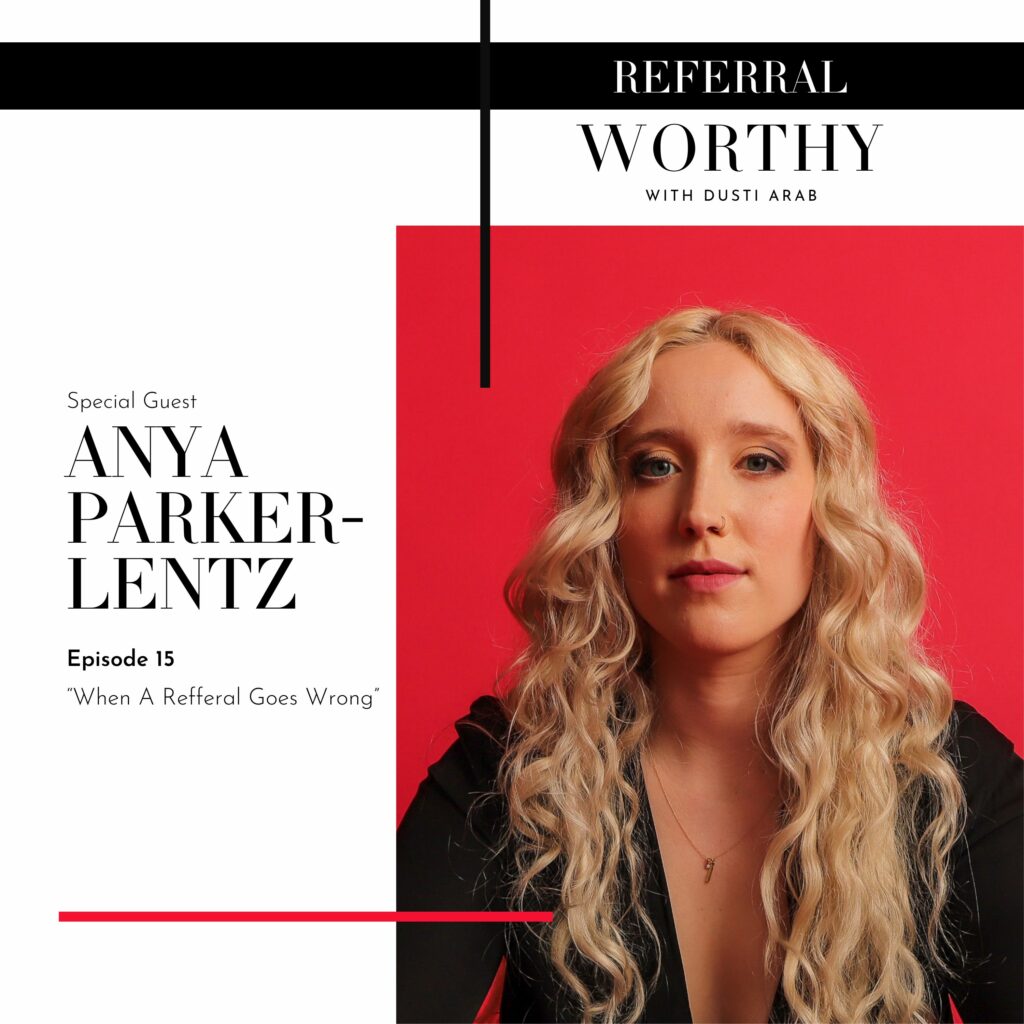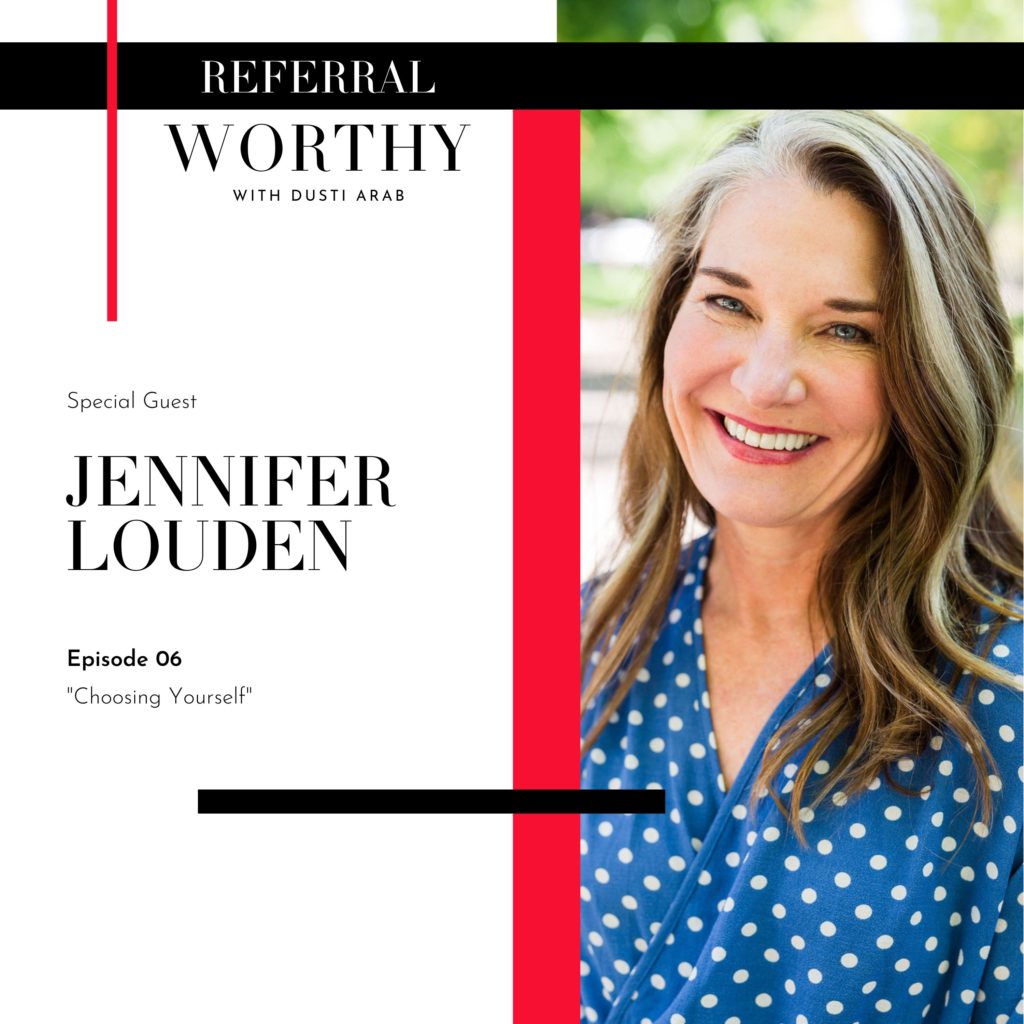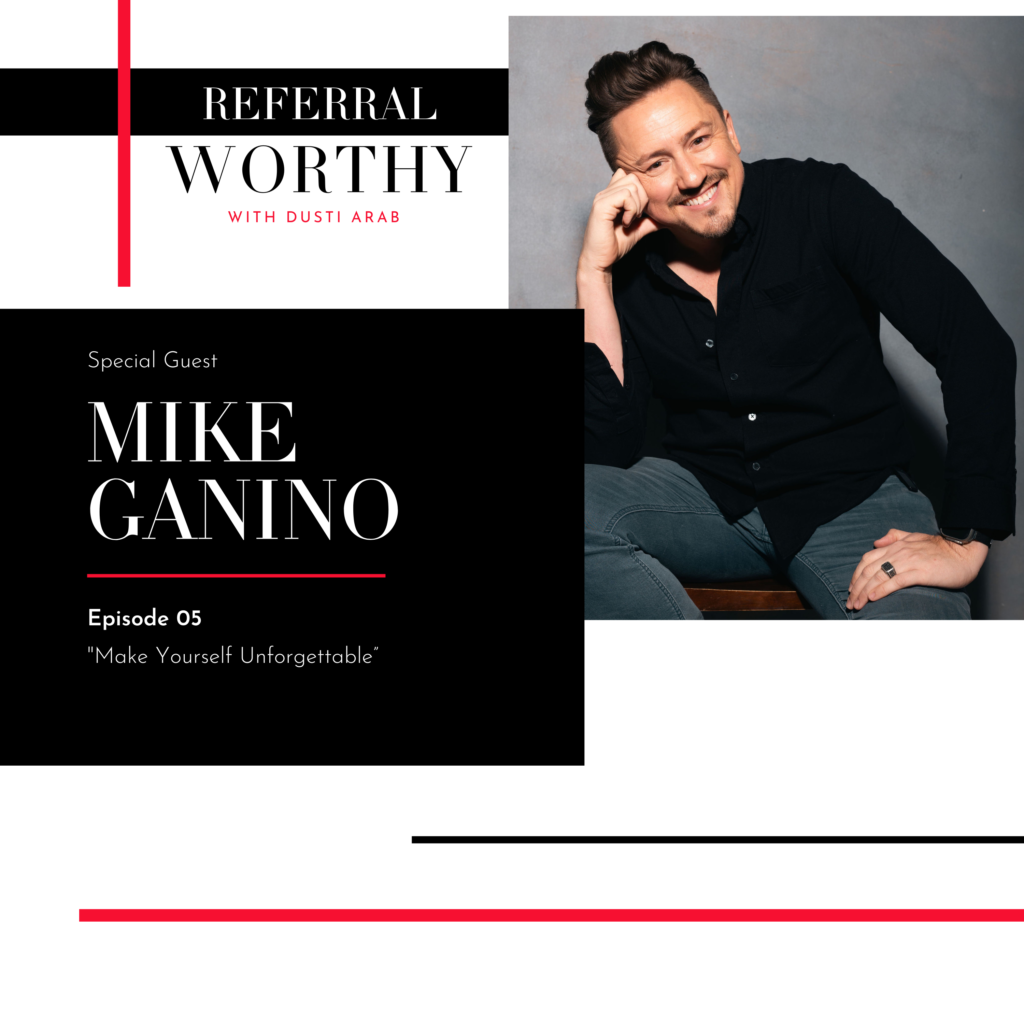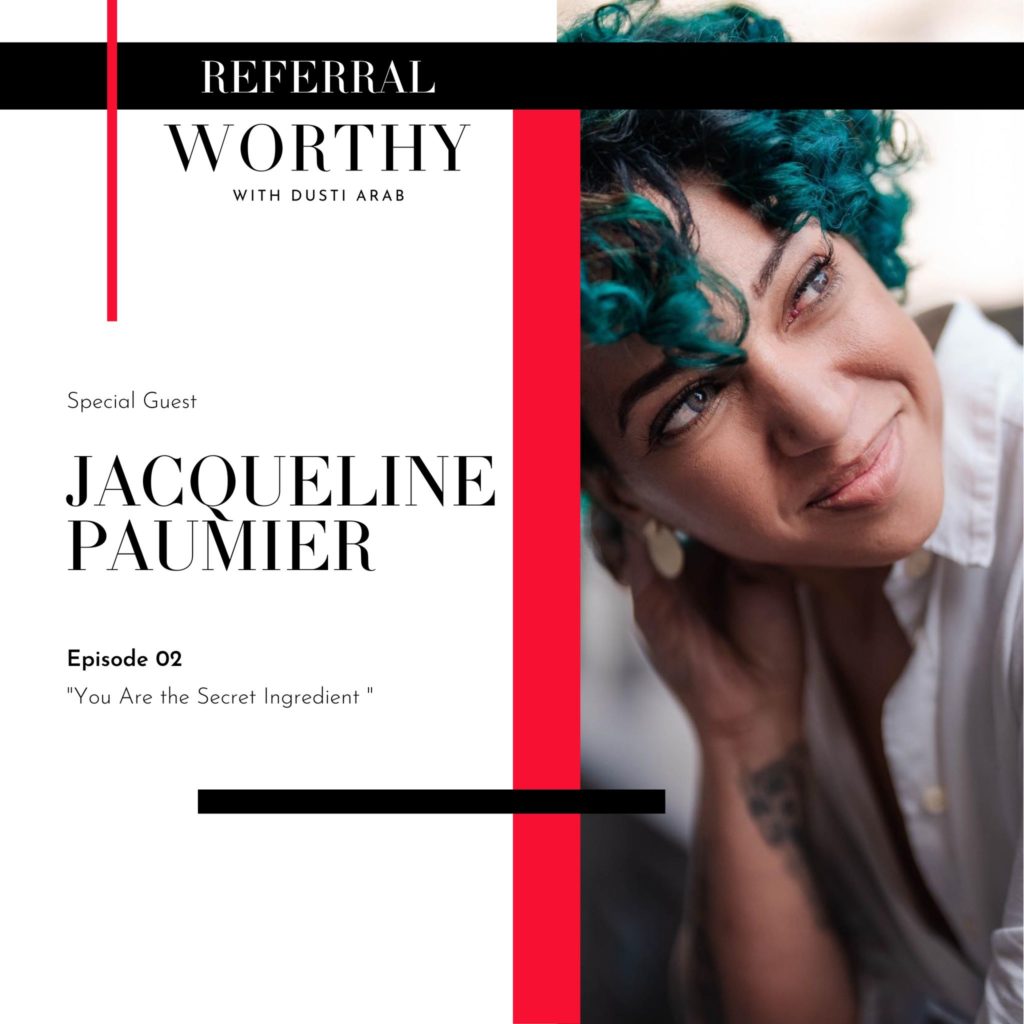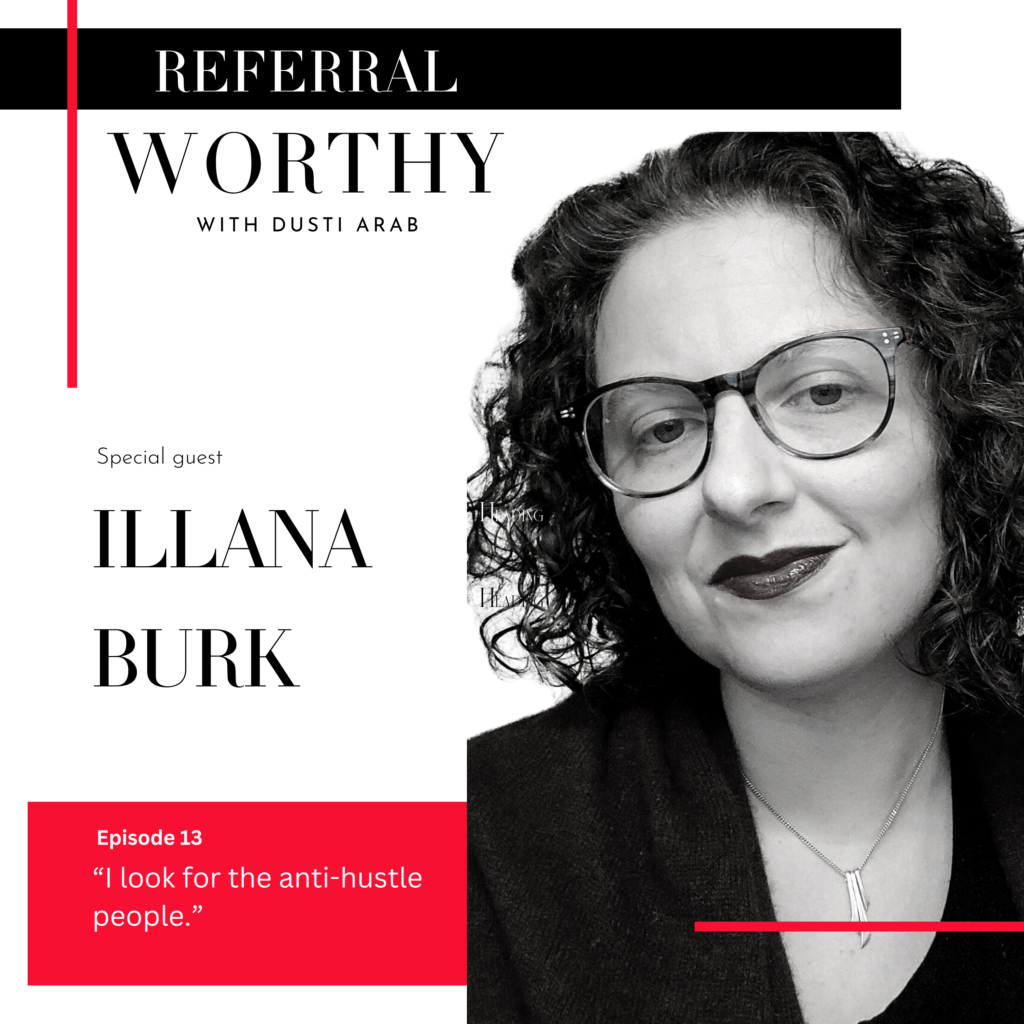
Listen above or subscribe on Apple Podcast + Spotify
In this episode of Referral Worthy, Dusti is joined by Illana Burk, a seasoned business and leadership coach and the force behind Your Life’s Workshop. Recently relocated to Portugal, Illana brings a wealth of experience, informed by her unique upbringing around entrepreneurial and sales environments.
The conversation explores Illana’s philosophy on client relationships, emphasizing respect, originality, and values alignment in making businesses referral-worthy. Listeners will gain an understanding of the practical steps of building a referral-based business and the significance of nurturing long-term professional relationships. Illana’s approach is not just about immediate success but fostering enduring connections that support sustainable business growth. This episode is a treasure trove of strategies for anyone looking to infuse their business practices with integrity and innovation.
Referral Worthy is hosted by Dusti Arab, Fractional CMO and marketing strategist. She's the founder of the reinvention co, a marketing consultancy for personality-driven companies with big online presences and small teams. Learn more at www.thereinvention.co.
Love this week's episode of Referral Worthy? Leave a review + subscribe!
Referral Worthy intro, outro and transition music is named We are invincible by Tim Hirst and was found on Epidemic Sounds.
“I would do the same thing now if I needed 10 more clients as if I needed my 10 first clients… It’s always direct connection. It’s reaching out to the people that you know… There’s no other way.”
– Illana Burk, on how she’d get her first 10 clients if she started over today
Dusti Arab: Hey, everybody, welcome back to Referral Worthy. I am here with Illana Burk today who is calling in from Portugal where she just moved recently, which is just the coolest thing ever to me. Illana is a business and leadership coach and she runs Your Life’s Workshop and is the host of the Good Business podcast. Thank you so much for taking the time. I know it is a significant time difference for us.
Illana Burk: Not too bad, but you’re absolutely welcome. Thank you for having me. As always, love you.
Dusti: I love you too. Okay. Illana, tell me your origin story. How did you end up doing this work?
Illana: Oh, that’s such a good question. Um, my origin story. Well, started a ways before my business started. I was raised in a really small town. I’m not actually gonna go back that far, I promise. But my mom was a designer and a sign painter. And I grew up kind of sitting at her feet and listening to her coach business owners on their image and their brand. And my dad was a timeshare salesman. So I grew up listening to him train people how to sell things, and that combination of things made for a pretty solid foundation for a business coach.
Dusti: Holy shit. Yeah, that’s like, I didn’t know either of those things. And that is, well yeah, obviously. Where the fuck am I gonna end up?
Illana: Right? Yeah, um, so fast forward. I, you know, got an MBA along the way and couldn’t figure out what I wanted to do with that. And I worked in the coffee industry for a long time. And when my last job ended, I started making jewelry and selling things on Etsy. This is actually going somewhere, I promise. Um, I was trying to kind of just make rent in between jobs and Etsy was still a relatively new thing, you know, back in like 2008, 2009, something like that. And I called my business Makeness because it was about a makers business. And I started blogging about business coaching a little bit for other makers, because I had this MBA and I had all this business experience and I was kind of helping other people in my Etsy team back when there was Etsy teams to figure out like, how to make their businesses go. And what I very rapidly found out was that there was other people who were doing that work way better than me. Like, way more than I did, specifically about like makers businesses, right like that. You know, there was back when Megan Auman was already really successful, and she had Craft Your MBA. I think she still does and it was like she knew things about trade shows and things that I didn’t know anything about. I just knew how to write a good piece of copy and how to market yourself, you know, so this went from being a makers business to being make a business because I started just doing more generalized businesses stuff. So that parlayed into a web design business and that parlayed into brand consulting, because I realized that I was giving my web design clients business coaching for free. Right, and that was actually my favorite part of my work was not so much the design but way more the advice giving because that was where my experience was. So over time, I went from, you know, designer to business coach exclusively and I had an agency for a decade and now I only do leadership business coaching. So that’s my sort of longish origin story.
Dusti: I mean, but I love hearing all those details also, like hearing about the early days of Etsy because like, I totally missed that. Like, I mean, early Etsy for me, it’s just Etsy that wasn’t actively screwing everybody on its platform.
Illana: Like yeah, no, this was like back in the good old days when like that young dude that was the original CEO was still in charge and like he would order things from Etsy sellers and it was all really cool and fun and like, I actually didn’t I didn’t know anything about online business, specifically when I was starting and another Etsy seller turned me on to Chris Guillebeau. And, and then Naomi Dunford, those of us old timers remember Naomi Dunford, from IttyBiz. And that was what started my journey on blogging and I’m realizing there was this whole world online of business owners and bloggers and people doing different things. And so over time, Makeness went away because every time I’d say Makeness, at a party, that people don’t know, yeah, worst business name ever. But it was memorable. Sort of.
Dusti: I thought it was memorable. I remembered it.
Illana: I know we’ve known each other that long. And yeah, so Makeness became Your Life’s Workshop about five years ago and that was in its you know, that’s history. Right.
Dusti: Absolutely. Well and Your Life’s Workshop has some serious super fans. You are the only business coach that I’ve brought on here for this season for lots of reasons.
Illana: That’s so awesome, thanks!
Dusti: Oh, absolutely. I mean, we have so much alignment on like values and what we care about seeing from like, especially like business owners who are still really building good foundations. And I think the way that you teach that is just, it’s so clear, and it’s so easy to understand. And like I mean, I feel like anybody who knows you and has worked with you is a fucking super fan. Like there’s no like, there’s no half way. So I’m so curious, though, like, if you could go back to Baby Baby designer like business owner, Illana, what advice would you give her?
Illana: Oh, man, um, I think having more faith in my core skills earlier. Like, you know, I think that I started off. I mean, my business kind of started off as more web design than anything else. And I didn’t really, I wasn’t really a designer. I liked being able to give people advice about their business. And that was like what I knew the most about, but I just sort of had a knack for design and at the time people didn’t hire business coaches, and copywriters, the way they do now. If you started a business, the one thing you knew you needed was a website. So being a web designer was my way in, and that was I really had that story for a really long time that that was my way in and I had to stick with it because people didn’t understand yet that they needed business coaches, they didn’t understand that they needed copywriters, and all these other things that are very ordinary now that kind of everybody hires for. But back then it was like, I want to start a business. I need a website and you couldn’t, I mean, you really had to work at it. If you were going to DIY it back then it was way harder. There was no Squarespace, there was no Wix and if they’re, you know, the baby stuff that was starting was still really hard and really rinky dink and everything was the same and so people were willing to shell out money for that. And I kind of, I think I leaned on that way too long and didn’t have enough faith in what I knew, to jump into what I knew over what I could provide soon enough. And I think that’s a mistake that a lot of business owners make, and I shouldn’t even say it’s a mistake, it wasn’t a mistake, right? You know, I had to put food on the table and it put food on the table for a long time. And that’s no small thing and I think doing service based business kind of gets a bad rap for that. It’s like a lot of us out here. We’re just trying to make a living, you know, so do the things that you need to do. But I do definitely wish I would have put more faith in my sense of expertise and what I could offer to people from a personal growth and business growth and like human growth standpoint earlier, because doing a lot of design work, it was really time consuming. It took me away from content building. I went from a really tactical standpoint. The one piece of advice I would go back to baby me is that whole list building thing was a lot easier back then. I really wish I would have paid a lot more attention to that. It was a lot easier. People were actually giving their email address away like candy. Yeah, now not so much. Not so much anymore. And I thought it was all big and dumb back then. And I was very anti establishment. I was like, I don’t care about list building. I really wish I would have. That would have made things a lot easier later.
Dusti: So yeah, oh man. There’s so much I relate to in that because I feel like in a lot of ways we kind of like we’re paralleling each other, like me on the copy side. For sure. Because like, when I came online, it wasn’t initially to make money. I just started blogging and then somebody told me I could make money. I was like really? Like, that’s cool. How do I do that?
Illana: Yeah, I think when we first met you were a minimalism blogger and like you had one of those like really lucky early breaks where like you blogged and then a bunch of people paid attention all at once and you had this like early idea that like oh, this is really not hard at all. Then it got harder, as I recall.
Dusti: Yeah. Well and like and that first six months was wild because it only took me like two weeks to get published on a bigger blog than mine to have my first article get picked up by Yahoo and go viral. And like had like a couple thousand people on an email list basically overnight. And honestly, like I just looked at it was like fuck, what do I do? What do I do with that?
Illana: It’s almost worse when you get immediate success like that. Because like, you don’t know that that’s not ordinary. You don’t know that that’s not gonna last forever. You don’t know that everything you write isn’t gonna go viral. Like, you don’t know that you have to keep maintaining that and it just gets harder and harder and harder. You don’t know that yet when it’s early, you know, so I’m all for the slow burn. I was a slow burner. I still am really, I’m the like, quiet secret weapon that you know. People still haven’t heard about it.
Dusti: I don’t think there’s anything wrong with that and building a business that’s all referrals, especially if you are providing any kind of service. And that, for me, is kind of where things transition. Like that’s when things got a lot better because then it wasn’t just taking whatever I needed to to put food on the table or whatever. It’s like I could get people who were kind of like pre vetted and that definitely made my life a lot better.
Illana: Yeah, yes, it does. It does when you don’t have to have those consults where you’re like everything about this person says I should not let them hire me. But I have to because I want to eat next week. It’s really nice when you graduate from that.
Dusti: Oh man, yeah. Not today, but someday I will tell the story about the site that I got made. Or somebody asked me to create a site for them and the inspiration they sent was a Where’s Waldo flash site and I’m not joking. They were like I want this but flamingos
Illana: That’s kinda awesome.
Dusti: The only site I’ve never put my name on the bottom of.
Illana: I think I’d be really proud of that actually.
Dusti: Oh, man. I got really, really high after that project was over. Like Good God. Good.
Illana: Oh, yeah.I think website projects, man I have so many stories. And I think if ever, you know after being in business for like, almost 15 years now there is definitely a small handful of people who probably like, wish a piano would fall on my head. You know? You can’t be in business that long without like a couple of projects going real bad and you know, or clients that just were left unsatisfied and that’s the truth of it right? Like you, I mean that whole idea of you can’t please everyone, big businesses barely please anyone. They piss everyone off. We have to please almost everyone. But there’s certainly those you know, and they’re always the ones that I knew from the beginning were going to be a mess, you know, and I had to take it for one reason or another. I don’t do that anymore. Obviously. Like it’s been a long time. I’ve you know, I think I’ve graduated from having to take clients that I’m like, this is definitely not going to work. But I think that you know, for those out there who are listening and are still like, I just wish somebody would notice that I exist. And they’re gonna take every client that comes by, you can’t really learn that lesson any way but the hard way. Like people like us that have been around longer, we can tell you don’t take the clients that you know are going to be shitty and wrong for you. But you’re not going to listen to me because you need the money, the money. And there’s no shame in that you do the best you can and you might give them unintended value and, and it might be a mess, but you’ll learn a lot.
Dusti: You’ll learn a lot. Okay, that’s a perfect segue here actually. Okay. So Illana, if you had to start from scratch today, like right now, how would you find your first 10 clients?
Illana: Oh, good question. Um, how would I find my first 10 clients? So like when you say, I need the rules here, like so when you say today? Do I have all the contacts that I actually have today? Or am I starting off like, Hey, I just discovered the internet and I have to find 10 clients. Those are different questions.
Dusti: Those are different questions. Um, that’s funny. I haven’t I haven’t gotten asked for specifics around this yet. I kind of like it. I was like, of course, it’d be the business coach who wants to know all the rules? Okay. I mean, honestly, I would be fine hearing about either, like obviously, it’s different when you’re starting with an established network, but like, Illana 10 years ago, like before you made that transition.
Illana: You know, I think that when you, I mean, the rules are still the same, honestly, like I would do the same thing now if I needed 10 more clients as if I needed my 10 first clients. And it’s, it’s gonna be, it’s always direct connection. It’s reaching out to the people that you know. There’s no other way anymore. You know, you can hustle your ass off on social media. You can publish tons of content. You can go do, you know, a tour of signature talks, you can go be on a bunch of podcasts, all of those things take a lot more time than most people have, though. If you need people and you need them yesterday and you’re trying to make rent next month, then you talk to the people that you know, you make a really clear offer, and you talk to the people that you know. You figure out what the most likely people that will say yes or might know somebody who will say yes, you figure out what they need and what you can provide for them and you go stand in front of them and say “Hi, I have a solution to your problem. Would you like to hire me?” There is no other way. There’s a million other answers, but there’s really no other way. And I have done that many times over the years, where I’ve sent up a flag to my network. I think it’s part of why having and maintaining relationships frankly like ours over the years, you know, we met when we were little baby bloggers with collective chips on our shoulders. And we’ve weathered the storms together over the years, just like we kind of dip in and out of each other’s lives and orbits and those relationships are, those are your lifeline as your business ages and changes. Those are the people that are going to promote you, that are gonna go out of their way for you, that are going to remember you when they start a new podcast and they want to have a business coach on. So the answer is the same. Anytime you need to grow it’s going to be about reaching out to the people you know, and that is the hardest answer because it there’s a there’s the dark side of that answer which is if you don’t know people who need what you’re selling, then you can’t do that yet. And that sucks. But then the answer is you have to go meet those people. You have to figure out where they are and you have to go meet them and offer them something. And it’s probably the only time where I ever advocate doing work for free, is when it’s a sample of bigger work. When you really need bigger clients, offering something that you can say, “Hey, I can do this, you know, 10% of my bigger work. And I want to show you what I can do in hopes that you’ll hire me for the bigger thing.” So that’s always the intention and that’s the way I would play it is like, let me do it. You know, I’ve done this before where I find myself with holes in my schedule and I’ll be like, hey, now’s the time. I would love to offer some free sessions to my community. I always get a couple of clients out of doing that.
Dusti: Yeah, that’s 100% my strategy too. Like, I actually haven’t done it in the last year and a half just because I was pregnant and exhausted. And now I’m booked, but doing 20 minute coffee chats once a year and taking like 20 of them and just seeing who raises their hand. Because yeah, same deal, like someone is going to hire me like guaranteed
Illana: And if they don’t, they will be your fan after that. If they weren’t before they will be your fan after that. And I know most people are not, they don’t focus in on creating raving fans one at a time. But like after 15 years, I have a laughably small list. I don’t have a massive pool of people that I’m constantly selling to or reaching out to. But when I send out a newsletter saying, “Hey, I have a couple of spaces.” I get an 85% open rate and I get a couple of inquiries because my people love me and are looking for those openings, you know. So what’s better, you know? It’s not always about volume. If I needed my first 10 clients, it would be reaching out to probably 50 or 60 people. You’ve got to do the math on that like, which this is like one of those lessons I learned from the timeshare salesman. The very best salespeople on planet Earth close at a rate of about 10%. If you close at a rate of 10%, you are the best of the best of the best on average. So if you figure if you need 10 clients then you need to plan on talking to about 100 people. If you want 10 people to say yes to you, that’s a lot. It won’t take that much though. Like because what we sell, how we sell, when you’re direct selling like that it doesn’t function the same way. But it’s a nice metric to have in your head because then you feel really satisfied when you talk to 20 people and 10 say yes. But it does take volume, you know, and especially when you talk to those people that don’t buy. Those people that don’t buy, talk about referrals, those will become your referral sources. If you give them an incredible amount of value in that free 20 minutes or free hour or whatever you offer them, like you give them value, they’re gonna remember. Almost everybody I have done one of those with has either bought something, sent me someone, or joined a group later or they hire me a year later when they can. It always pays off just not always right away. So a lot of that is like planting those seeds for later.
Dusti: I am totally supportive of this method. Like I feel like there are too many people thinking that it’s going to happen faster. Like, and this is something that I’ve talked to a lot of folks about this over the years and they’re like, “Oh, well like my cycle what some folks is like two to three years before they buy” and I’m like, good. That means that your people are actually thinking about this investment and they’re going to show up and be fucking great clients. Because same deal, like calls that I did with people that I may or may not remember from a couple of years ago. Those people, the chances of them turning into clients later on when they can afford me if I’ve been like giving value this whole time and helping them solve these smaller problems so that they can pay my, you know, exorbitant rates now, like that, for me, means so much more because they had to put in the work. They had to do so much to be able to do that. And that’s not something that I take lightly as a business owner.
Illana: Yeah. Yeah. I think that having respect for people’s time is such a huge thing. It’s like if someone is willing to show up and give you 20 minutes or an hour of their time, it’s, you have to treat them like their time is just as valuable as yours. And when you do that, whether it’s free or paid, I treat them, you know, when I give away hours, they get the exact same level of service that my clients who are paying me $1,000 a month, that they receive because we pay with currency, whether it’s time or money always, you know. So when you give that kind of value to people, no matter what level they’re at, whether they can hire you or not, whether they can afford you or not, there’s something that changes that’s different about that then people finding you on Tik Tok or finding you through you know four trip wires and a crazy long funnel and a you know, 19 email nurture campaign. It’s like, there’s something different about it. That hour that I spend with somebody is always more valuable. Always.
Dusti: Yep. I love the one to one. Okay, so Illana, what makes a business referral worthy to you?
Illana: That is an unexpectedly hard question. You mentioned you’re gonna ask me that. And I’m like, I thought that was gonna be like a softball. And now I’m thinking about it and that’s actually really difficult. Because I think about the people that I tend to refer out and usually, they are people who understand something that’s difficult to articulate. They understand the complexity and entanglement of the personal and the professional and they treat people with an incredible amount of respect, no matter what level they are, how much they’re being paid. And then, frankly, I look for people with good taste. Um, I have had plenty of people in my orbit that are very experienced and I’ve had good experiences with people you know, when we’re talking about people like VAs and designers and copywriters, and I look at their work and I’m just like, this is littering the internet with garbage. And I’m really happy that people had a good experience, but it’s because they didn’t know any better and that sucks. That makes me sound deeply pretentious, but I can’t help it. I’m a designer. I’m just, that’s the way it is. So I get a little pretentious about these things. So I look for…somebody who’s referral worthy is someone who is going to be flexible, respectful. They carry their values in a really front facing way in their business and not in a performative way. My business and I talk a lot about values and I think it gets, in this current world of virtue signaling and ethical business being a new buzzword, it’s frustrating. I know you and I have you know, we have been banging this drum for longer than most and the fact that that of all things has become a marketing tactic is so gross. So when I think about who I refer, I look for people who I know actually behave with a level of equity instead of performing a level of equity. I look for people who are creating something that is unique and interesting to them. And they’re doing things their own way and that understand their strengths and weaknesses and put those front and center. So basically, I look for the anti hustle people. You know, when I hire a VA, it’s rarely somebody who says they’re a VA, it’s usually a business owner who doesn’t want to work that hard anymore for their own business, but they know how to do all the stuff and they have the right temperament for it because they’re going to treat my work with respect. And they’re going to understand how everything interplays with one another. I’ve never actually hired somebody who was an advertised VA as that role for me, like, I look for…
Dusti: That’s so interesting. Like temperament makes sense. Like I totally understand hiring for that first and that’s definitely a mistake I’ve made with that role before. But it’s interesting to me that getting business owners who don’t want to do the thing anymore, like that that’s worked for you. Because what I have seen is like failed coaches who are like “Oh, well I can do, you know, I already DIYed my shit, so now I’m an expert in this” and like, and those people have been fucking awful to work with, like in my experience.
Illana: See, it’s I think maybe it’s about, I sort of do more of like a plucking thing of like, I go to a friend who I’m like, “Hey, I know you kind of decided you don’t want to do this health coaching hustle thing. Would you be interested in uploading my podcast episodes for me and I’ll pay you a couple hundred bucks a month” and they’re like, “Sure, I can do that.” That’s more like they’re not, they’re not hustling for the work which I think is the difference you know? Because I have a really broad network I do more of a like tap tap tap on the shoulder when I know somebody’s like a little hungry or they’re just looking for something, a side hustle or something. And I also have multiple people doing multiple things. I don’t tend to hire one person for all the things.
Dusti: That makes sense.
Illana: Cuz I’ve also found that it’s like, when one person drops off and your whole business falls apart. So I look for, I’d rather pay people for small pieces, you know, and then all the plates stay spinning when someone gets sick or decides to have a baby or something, you know. But as far as what’s referral worthy, it is so much about temperament. It’s so much about the people who are working hard to do something interesting with their work. That’s really, when it comes down to it, I look for the people who are doing interesting work, who are doing something different than what everybody else is doing. So, you know, originality, respect values. I have kind of a high bar for referral so
Dusti: As you should. Everyone should have a high bar for referrals.
Illana: Yeah, yeah. And, um, but I also think, I love you’re doing the show, because referrals are so important. They’re so important to so many of us, especially those of us who are like, not that interested in all the hustle stuff. I mean, my business depends on referrals. And so I invest a lot of time and energy in making sure I’m somebody who sends out good ones too, because when you offer good referrals, you get them back, you know. And that is a big deal. So, you know, I’ve sent you people, you’ve sent me people, we’ve done a lot of referring over the years.
Dusti: You’re very easy to refer to which I love.
Illana: You know, because when you send somebody someone and they make you look good because the person has a great experience with them, it’s, there’s nothing better. It’s like that ups your professional credibility across the board.
Dusti: Oh my god. Illana, this was so much fun. Where can people who want to learn more about you and work with you find you
Illana: Very easy, you can find me at YourLifesWorkshop.com. All the details about the Good Business podcast, which is a solo show. If you’re looking for free business advice, it’s pretty much all I do. I just teach on it. It’s just me telling you things that are important that you need to know. So you can find information there or on all the podcast services obviously. And yeah, that’s about it.
Dusti: Fabulous. Thank you again for joining me.
Illana: My pleasure, it was super fun. Thanks for having me, Dusti. Bye.
Filed Under:
Episode Links:
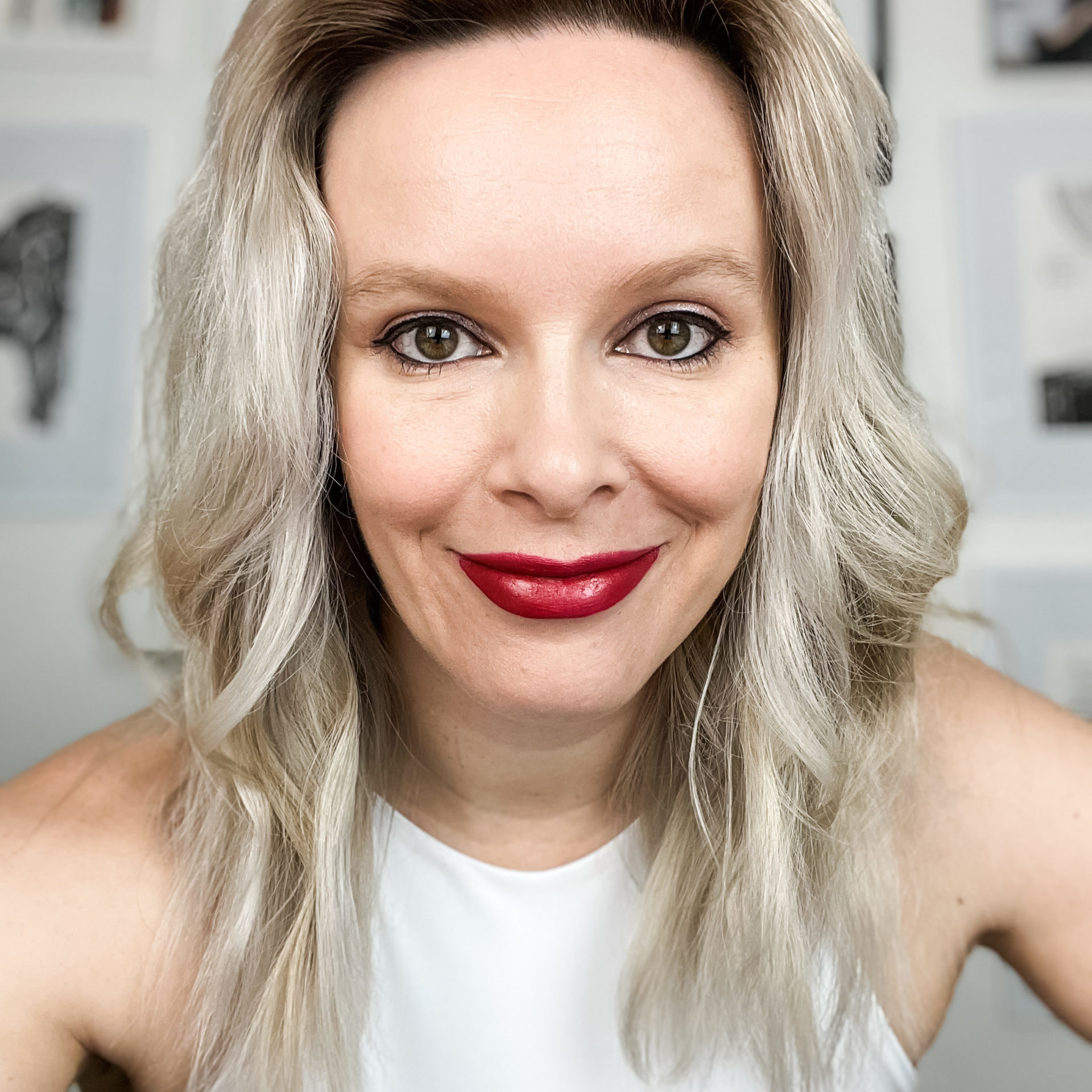
Dusti Arab, Fractional CMO
And the founder of the reinvention co, a marketing consultancy specializing in working with personality-driven companies with small teams.
Intense, fun, and relentlessly practical, Dusti understands the lives of small business owners are deeply intertwined with their businesses, and if their marketing is going to be sustainable, it can’t get in the way of why they do what they do. (And honestly? It should be fun so they actually want to do it.)
She is the host of Referral Worthy, a podcast for small business owners ready to go from “best kept secret” to the go-to name in their niche.

